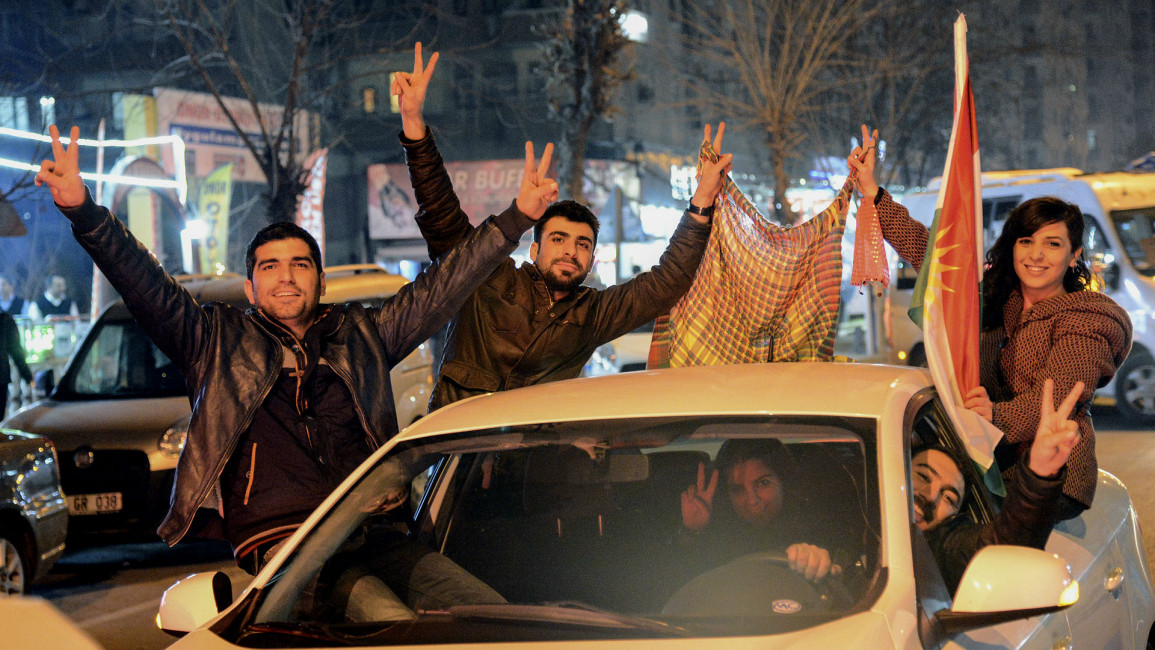Residents trickle back to Syria's Kobane as IS expelled
Jubilant residents began trickling back to Kobane Tuesday after Kurdish fighters drove the Islamic State group from the Syrian border town, which became a major symbol of resistance against the militants.
But officials warned that IS extremists were still present in villages around Kobane, and that massive reconstruction was needed in the devastated town after more than four months of fighting.
Its recapture has deprived IS of a strategic prize on the frontier with Turkey to add to its self-styled caliphate spanning swathes of Syria and Iraq. An estimated 200,000 people living in Kobane and surrounding villages had fled across the border into Turkey after the fight for the town began on September 16. The Kurdish People's Protection Units (YPG) announced the "liberation" of Kobane on Monday.
"Our forces fulfilled the promise of victory," the militia said in a statement, cautioning that fighting in the area was not over yet.
"The process to ultimately liberate Kobane canton (region) is ahead of us. We pledge that we will successfully carry out this promise as well."
There was fighting in villages around the town on Tuesday, both to the southeast and the southwest, according to the Syrian Observatory for Human Rights, a Britain-based monitor.
Kobane activist Mustafa Ebdi said the US-led coalition fighting IS carried out fresh air strikes around the town on Monday evening and Tuesday morning.
'A big blow’
At one point, IS looked poised to take control of the town. It vastly outgunned the YPG forces, wielding sophisticated weaponry captured from Iraqi and Syrian military bases and fielding fighters from around the world.
It lost nearly 1,200 fighters in the battle for Kobane, of a total of nearly 1,800 killed, according to the Syrian Observatory on Human Rights. Analysts said air strikes by the US-led coalition had been key to the Kurdish success, taking out some of the militants heavier weaponry and hitting their supply routes.
Forces from the Iraqi Kurdish peshmerga, as well as some Syrian Arab opposition forces, also reinforced the YPG in the fight.
IS emerged in Syria in 2013, and quickly captured large areas there and in neighbouring Iraq, imposing its distored interpretations of Islamic terachings. But analysts said the loss of Kobane could put the brakes on its plans for expansion.
"Despite all that manpower, all that sophisticated weaponry, IS couldn't get the city, so it's a big blow for their plans and it's a great achievement for the Kurds," said Kurdish affairs analyst Mutlu Civiroglu.
Kurdish autonomy
As Kurdish forces declared victory over Islamic State Group in Kobane, Turkish President, Recep Tayyip Erdogan reaffirmed Monday his opposition to the establishment of a Kurdish-controlled autonomous government in northern Syria.
"We do not want a new Iraq. What's this? Northern Iraq," Erdogan told Turkey's Hurriyet newspaper aboard a plane en route home from an African tour.
He was referring to the Kurdish-controlled part of Iraq known as Iraqi Kurdistan.
Kurdish forces gradually pushed back IS militants who have captured large chunks of territory in Iraq and Syria, with the help of the US-led air raids and a group of fighters from Iraq's Kurdish peshmerga forces.
Turkey, which has fought a 30-year insurgency against Kurdish fighters demanding autonomy in its south-east, has hesitated to act in defence of Kobane over fears it could embolden Kurdish forces.
Erdogan had previously said that his country will not allow "a terrorist group to establish camps in northern Syria" and threaten Turkey.
Ankara alongside the US, NATO and the European Union have blacklisted the Kurdistan Workers' Party (PKK) as a terrorist organisation and sentenced its leader Abdullah Ocalan to life in prison.
| We do not want a new Iraq. What's this? Northern Iraq. - Recep Tayyio Erdogan, Turkish PM |
The PYD which led the fight against the IS in Kobane is seen as the Syrian branch of the PKK.
Turkey has refused to play a robust role in the fight against the IS group, prompting its own Kurds to take to streets in October in two days of street clashes that left 30 dead.
Turkey's sole contribution to the coalition has been allowing a contingent of Iraqi peshmerga Kurdish fighters to transit Turkish soil to fight IS militants in Kobane.
The Kurds are the world's largest stateless people, spread between Iraq, Iran, Syria and Turkey after missing out on a state of their own in the border changes after World War I.
In recent years, Turkey has enjoyed burgeoning trade and energy ties with the Iraqi Kurdish region, while at home Ankara has started a peace process with its sizeable Kurdish minority with an ultimate goal of disarming PKK fighters.
Erdogan also renewed his call for a no-fly zone in Syria and criticised what he said was a failure by fellow NATO member the US to target the regime of Syrian President Bashar al-Assad in Syria.
Washington is "not keen on any action that targets the regime," Erdogan said.
"Then there cannot be any solution."
"We have a clear policy on Syria. We never think about modifying it. The regime is our target. It cannot continue with the Assad regime," said Erdogan.



